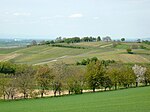Buggingen

Buggingen is a municipality in the district of Breisgau-Hochschwarzwald in Baden-Württemberg in southern Germany located between the Rhine Valley and the Black Forest on the northern edge of Markgräflerland. Buggingen lies in the western part of the pre-Black Forest mountains. It is home to many vineyards and is a largely agricultural center. It also is home to Germany's largest tech mail order company. Buggingen administratively also includes Seefelden and Betberg. History The village was first referred to in 778. It was mentioned in the "Urkundebuch" of the monastery of Lorsch as "Buchinger marca". In 940 the village shifted to the control of the Bishop of Constance. As far as can be ascertained, Buggingen has been associated with vineyards throughout its history. The settlement of Buggingen has its origins in the alemannische. As a number of documents confirm, the majority of the property was in the hands of the church. Property owners were the monasteries in Lorsch, St. Blasien, Tennenbach, St. Peter, St. Trudpert, Sulzburg, Kappel, Neuenburg, Adelhausen, Sitzenkirch und Sölden. In 1934, 86 people were killed in an accident at a salt mine near Buggingen. The site of the mine, which was opened in 1904 and closed in 1973, is now a museum.
Excerpt from the Wikipedia article Buggingen (License: CC BY-SA 3.0, Authors, Images).Buggingen
Hauptstraße, GVV Müllheim-Badenweiler
Geographical coordinates (GPS) Address Nearby Places Show on map
Geographical coordinates (GPS)
| Latitude | Longitude |
|---|---|
| N 47.848055555556 ° | E 7.6369444444444 ° |
Address
Sankt Marien
Hauptstraße 10
79426 GVV Müllheim-Badenweiler (Buggingen (Kernort))
Baden-Württemberg, Germany
Open on Google Maps






